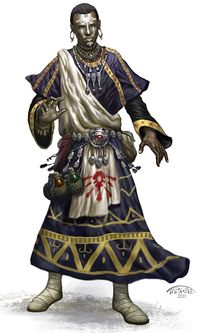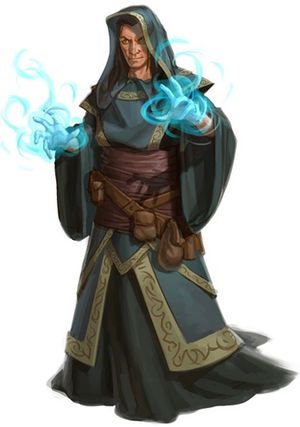Difference between revisions of "Wizard"
| Line 18: | Line 18: | ||
|- |
|- |
||
| style="background:#ccc;"|'''Pathfinder Rules for''' |
| style="background:#ccc;"|'''Pathfinder Rules for''' |
||
| − | |[http:// |
+ | |[http://paizo.com/pathfinderRPG/prd/classes/wizard.html#_wizard Wizard] |
|} |
|} |
||
Revision as of 18:09, 30 August 2012

|
| ||||||||||||
Once apart in the world, wizards now stand challenged by the advance of artifice and by the crumbling of the once-respected Conclave of Rune. The relation between wizards and artificers has, officially, been tumultuous. That is not to say that individual wizards and artificers do not find matters of agreement--rather, it often means that their methods of working, their goals, and their faiths, tend to be vastly different and it tends to lend itself to different mindsets and goals. This mindset has been most prominent in guilds and organizations--who often find themselves at odds economically as well as idealistically.
The title of "wizard" still carries an aura of mystique, though in many, but not all places--wizards are an accepted part of life. From low-level tinkerers to masters of the art, from the kindly crafter of fireworks to the devious crafter of ancient wonders, wizards have long been found upon Ea's landscape. Thus, fear of magic tends to be relatively rare--though fear and mistrust of specific types, especially the darker arts, is a growing concern. With Rune's Conclave out of the picture, wizard schools have become more localized, with local traditions, and the practice of the darker arts has become less accepted, not more.
With Rune's loss, and the fall of their famed God of Magic, the nature of magic is changing underneath the feet of these arcanists. With Eluna on one side, and Taara on the other, the image of the mage is less the bookish know-it-all than it is the individual with purpose and goals. Wizards are now even more divided amongst themselves by ideology, giving rise to the famous (and spectacular) Wizard's Duels. They've joined politics, exploration teams...the role and realm of wizardry is changing from something more passive to something...different.
Oddly, this increased competition has increased the rate of study, of discovery, and new arcane wonders are being discovered more often than before. To some, this was a long-needed shake-up. To others, more comfortable in bookish studies, they worry it might have gone too far.
In the minds of the public, wizards have been associated with the Convocation of Rune for most of known history. Rune, through its efforts, has been responsible for much of the wizardly order and education. With the fall of this nation, wizards have taken to forming smaller convocations, which are run officially by various nations. This has had the effect of a greater variety of local flavor and invention. Rune's laws and influence still hold sway, however--necromancy remains a dark art, and Taara's influences ensure it will remain so.
Most wizards hold to an abstract philosophy named the Covenant of Mana. The Covenant describes the use and invocation of magic--its roots are lost to history, but it's likely it was inspired from Animus, Himself. This philosophy often guides the wizard's outlook, though it too is fracturing...
Additional Options
Additional spells and familiars are available.
Starter Kits
Wizards are experts in the arcane field, and can cast a variety of spells, though they have to plan what they want to cast at the beginning of each day. They tend to have a high intelligence, and focus on knowledge skills. A higher dexterity can be useful for defense, and going earlier in the combat round so they can quickly buff their allies, or raise a barrier, for example.
Wizards typically focus on buffs for their allies, utility, and battlefield control, and will choose their spells around these concepts. Blaster wizards are also popular. The feats Spell Penetration and Greater Spell Penetration will be important around mid levels and higher for any mage.
| Concept | Attributes | Feats and Skills | Common Spells | Notes |
| Scholar | Int 16+ | Key Feats: None
Recommended Feats: Toughness, Improved Initiative, Spell Focus (Any), Skill Focus (Knowledge/Any, Spellcraft) Key Skills: All Knowledge skills (Arcana, Nature, Dungeoneering, Religion, The Planes and Local cover monsters), Spellcraft Additional Skills: N/A |
You're the type of guy that prefers books over people. Your theoretical knowledge is second to none. You easily identify the weaknesses and strengths of that which you and your party faces. |
Want to help out? Have an idea for a concept? Share it here.
